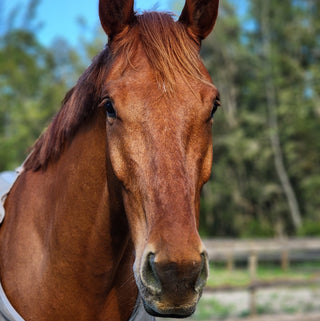Retiring a Grand Prix Dressage To Trail Ride: Nutritional Concerns
In this blog, I'll discuss the importance of understanding the nutritional requirements for dressage horses and why they may be different from those for trail riding horses and give some advice regarding how to transition your retiring GP horse. Proper nutrition plays a critical role in the health, performance, and well-being of horses, and it's essential to understand the specific needs of each horse, especially for those involved in dressage. In this blog post, we'll delve into the details of the nutritional requirements for dressage horses, why they may be different from trail riding, and what you need to know to ensure your dressage horse is getting the right nutrition.
What are the nutritional requirements for dressage horses?
Dressage horses- especially GP horses- have unique nutritional requirements due to the physical demands of their sport. Dressage involves demanding movements, such as extended trots, pirouettes, and piaffe, which require a lot of energy and muscular endurance. To perform at their best, dressage horses need a diet that provides them with the necessary energy, Protein, and nutrients to support their performance.
Protein is a crucial component of a dressage horse's diet. Horses use Protein to build and repair muscle tissue, which is essential for maintaining strength and endurance. Dressage horses need more Protein than trail riding horses, as their muscles are working harder and need more support. Additionally, dressage horses also require more carbohydrates, such as grains and hay, to provide them with the energy they need to perform. The key is to find a balance between providing enough energy to support performance while not overloading the horse with excess Carbohydrates, which can lead to weight gain and other health problems.
Why may the nutritional requirements for dressage horses be different from trail riding?
The main difference between the nutritional requirements for dressage horses and trail riding horses is the amount of energy and Protein needed to support their respective activities. Trail riding horses are typically moving at a slower pace and covering shorter distances, so they require less energy and Protein. Dressage horses, on the other hand, are performing demanding movements and need more energy and protein to support their performance.
Another factor to consider is the duration of the activity. Trail riding typically lasts a few hours, while dressage competitions can last several days. This means that dressage horses need to be able to sustain their energy levels and perform at their best over an extended period, which requires a balanced and nutritious diet. That said, some trail riders also ride their horses over a period of days, so ultimately it depends on the type and duration of the trail riding you're planning on doing.
What should you consider when feeding a retire dressage horse?
When a dressage horse retires, its nutritional requirements change. Retired dressage horses are no longer performing demanding movements, so they need less energy and Protein. It's important to adjust their diet accordingly to prevent weight gain and other health problems. When feeding a Retiring GP dressage horse, it's essential to monitor its weight and adjust its diet accordingly. A retired dressage horse may still require some carbohydrates for energy, but it's essential to find a balance that prevents weight gain.
Additionally, it's essential to continue providing Protein to support muscle health, even though the horse is no longer performing at the same level. In conclusion, the nutritional requirements for dressage horses are different from those for trail riding horses. It's essential to understand these differences and provide dressage horses with the necessary energy, Protein, and nutrients to support their performance. When a dressage horse retires, it's crucial to adjust its diet accordingly to prevent weight gain and maintain its health and well-being.

